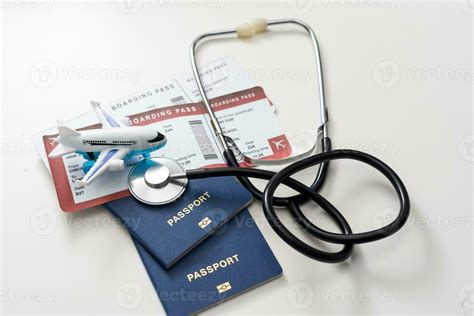Health Insurance Abroad

When traveling or living abroad, health insurance is an essential aspect of your travel plans that should not be overlooked. It is a vital component of any trip, ensuring you have access to medical care and financial protection in case of unexpected health emergencies. With the right international health insurance, you can have peace of mind, knowing that you are covered for a range of medical expenses, from routine check-ups to emergency treatments.
Understanding the Importance of Health Insurance Abroad

Traveling to a foreign country can expose you to various health risks and unfamiliar healthcare systems. Without adequate insurance coverage, you may face significant financial burdens and logistical challenges in accessing medical services. Here’s why health insurance for your travels is crucial:
- Medical Emergencies: Accidents and illnesses can happen anywhere, and having insurance ensures you receive prompt and appropriate medical attention. It covers expenses for hospitalization, surgery, and other critical care.
- Routine Medical Care: Health insurance often includes coverage for routine check-ups, prescriptions, and even dental and vision care. This ensures you can maintain your health while away from home.
- Financial Protection: Medical treatment costs can be exorbitant in some countries. Health insurance provides financial security, ensuring you don't have to bear the full brunt of these expenses.
- Peace of Mind: Knowing you are covered allows you to focus on enjoying your trip without worrying about unforeseen medical costs.
- Ease of Access: With health insurance, you can more easily navigate foreign healthcare systems, as insurance providers often have established networks of medical facilities and professionals.
Types of Health Insurance for International Travel

There are several types of health insurance policies designed specifically for international travel and living abroad. These policies cater to different needs and budgets, ensuring you can find the right coverage for your trip.
Short-Term Travel Insurance
This type of insurance is ideal for travelers who are planning a short trip abroad, typically lasting from a few days to a couple of months. Short-term travel insurance policies often offer comprehensive coverage for medical emergencies, trip cancellations, lost luggage, and more. They are designed to provide temporary protection during your travels and may include additional benefits like coverage for adventure sports or trip interruptions due to natural disasters.
| Coverage Highlights | Key Features |
|---|---|
| Medical Emergencies | Covers hospitalization, surgery, and emergency transportation. |
| Trip Cancellations | Reimburses non-refundable trip costs in case of unforeseen circumstances. |
| Adventure Sports | Provides coverage for injuries sustained during certain adventure activities. |
| Baggage Loss/Delay | Reimburses for lost or delayed luggage, and sometimes for personal effects. |

Long-Term Expatriate Insurance
Expatriate insurance, also known as international health insurance, is designed for individuals who plan to live or work abroad for an extended period, typically more than six months. These policies offer comprehensive coverage similar to domestic health insurance plans, including coverage for pre-existing conditions, routine medical care, and emergency services. Expatriate insurance plans often come with additional benefits like coverage for maternity care and specialist referrals.
| Coverage Highlights | Key Features |
|---|---|
| Pre-Existing Conditions | Covers certain pre-existing medical conditions after a waiting period. |
| Maternity Care | Provides coverage for pregnancy-related care and childbirth. |
| Routine Medical Care | Covers annual check-ups, prescriptions, and specialist referrals. |
| Global Coverage | Offers coverage worldwide, ensuring you're protected wherever you travel. |
Student Health Insurance
If you’re an international student studying abroad, student health insurance is a crucial component of your academic journey. These policies are designed to cover the unique needs of students, providing comprehensive medical coverage, including mental health services, prescription drugs, and emergency care. Many universities and colleges require international students to have adequate health insurance coverage as a condition of enrollment.
| Coverage Highlights | Key Features |
|---|---|
| Mental Health Services | Covers counseling and therapy sessions for students' well-being. |
| Prescription Drugs | Provides coverage for prescribed medications, ensuring access to necessary treatments. |
| Dental and Vision Care | Offers coverage for routine dental and vision check-ups and procedures. |
| 24/7 Emergency Assistance | Provides round-the-clock assistance in case of urgent medical needs. |
Key Considerations When Choosing Health Insurance for Your Travels
When selecting a health insurance plan for your international travels, it’s important to consider several factors to ensure you get the right coverage for your needs. Here are some key considerations:
Duration of Your Trip
The duration of your trip is a critical factor in determining the type of insurance you need. If you’re traveling for a short period, a short-term travel insurance policy may be sufficient. However, for longer stays, an expatriate or student health insurance plan would be more appropriate.
Destination and Activities
The destination you’re traveling to and the activities you plan to engage in can impact your insurance needs. Some countries have higher healthcare costs, while others may have unique health risks. Additionally, if you’re planning adventurous activities like skiing or scuba diving, you’ll want to ensure your insurance covers these activities.
Pre-Existing Medical Conditions
If you have pre-existing medical conditions, it’s crucial to choose a plan that covers these conditions. Not all insurance plans provide coverage for pre-existing conditions, and those that do often have waiting periods or exclusions. Make sure to carefully review the policy terms to understand the coverage for your specific condition.
Financial Coverage and Limits
Health insurance policies have varying financial coverage limits. Ensure that the policy you choose provides adequate coverage for the potential medical expenses you may incur. Consider factors like the cost of living in your destination country, the local healthcare system, and any specific medical needs you may have.
Network of Medical Providers
Insurance companies often have networks of preferred medical providers. When choosing a plan, consider the network of providers in your destination country. Ensure that the network includes reputable hospitals, clinics, and specialists that you can easily access in case of an emergency.
Customer Support and Claims Process
The insurance provider’s customer support and claims process can significantly impact your experience. Choose an insurance company with a reliable customer service team that can assist you in multiple languages, especially if you’re traveling to a non-English speaking country. Understand the claims process, including any required documentation and the turnaround time for claim settlements.
Maximizing Your Health Insurance Coverage Abroad
Once you have selected the right health insurance policy for your travels, there are several steps you can take to maximize your coverage and ensure a smooth experience:
Read the Policy Document
Take the time to carefully read through your insurance policy document. Understand the coverage limits, exclusions, and any specific conditions or requirements for making a claim. This knowledge will help you navigate any potential challenges and make the most of your coverage.
Keep Important Documents Handy
Always carry your insurance card and any other important documents, such as your policy number and contact details for the insurance company’s emergency assistance service. These documents can be crucial in case of an emergency.
Register Your Policy with Your Embassy or Consulate
It’s a good idea to register your insurance policy with your country’s embassy or consulate in the destination country. This step can provide additional support and assistance in case of an emergency.
Understand the Local Healthcare System
Take the time to research and understand the local healthcare system in your destination country. Know the process for accessing medical care, including any specific requirements or procedures. This knowledge can help you navigate the system more efficiently in case of a medical emergency.
Stay Informed About Travel Advisories
Stay updated with travel advisories and health alerts for your destination country. This information can help you prepare for potential health risks and take necessary precautions. Many governments and international organizations provide regular updates on travel advisories, including health-related information.
What happens if I need medical treatment while abroad and don’t have health insurance?
+If you require medical treatment abroad and don’t have health insurance, you may face significant financial burdens. Medical costs can be exorbitant in some countries, and without insurance, you’ll be responsible for paying these expenses out of pocket. This could lead to financial strain and even prevent you from receiving necessary treatment. It’s always advisable to have adequate health insurance coverage when traveling internationally.
Can I get health insurance coverage for pre-existing conditions while traveling abroad?
+Yes, some health insurance plans for international travel do cover pre-existing conditions. However, it’s important to note that not all plans provide this coverage, and those that do often have specific requirements and waiting periods. When selecting an insurance plan, carefully review the policy to understand the coverage for pre-existing conditions, including any exclusions or limitations.
How do I choose the right health insurance provider for my international travels?
+When choosing a health insurance provider for your international travels, consider factors such as the company’s reputation, financial stability, and the scope of coverage offered. Look for providers with a global network of medical facilities and professionals. Read reviews and seek recommendations from fellow travelers or expatriates. Ensure the provider offers 24⁄7 emergency assistance and has a reliable customer support team.


